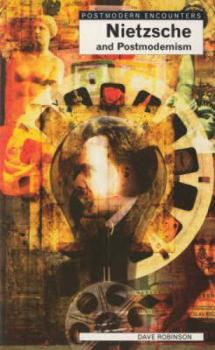Nietzsche and Postmodernism
(Part of the Postmodern Encounters Series)
In the POSTMODERN ENCOUNTERS series, Dave Robinson explains the key ideas of this Anti-Christ philosopher and then provides a clear account of the central themes of postmodernist thought exemplified... This description may be from another edition of this product.
Format:Paperback
Language:English
ISBN:1840460938
ISBN13:9781840460933
Release Date:August 1999
Publisher:Totem Books
Length:77 Pages
Weight:0.15 lbs.
Dimensions:0.3" x 4.4" x 7.0"
Customer Reviews
1 rating
A Good Springboard to Jump into Nietzsche
Published by Thriftbooks.com User , 23 years ago
If each age has its founding prophet, then Nietzsche occupied that role for our postmodern world. No other 19th Century thinker foreshadowed the collapse of the Enlightenment project with such grandeoise eloquence. Nietzsche himself prophesised that he was writing for a future audience since his contemporaries were still looming in notions of Truth, Objectivity, and Universal morality -- "Christian dogmatic entrails", as he once rudely put it. It is no surprise that today Nietzsche enjoys such wide appeal, since we are his anticipated audience.If you know nothing about Nietzsche and/or postmodernsim, then Robinson's book is a good, concise and simple introduction. Robinson successfully shows how some of the most significant ideas of many major 20th Century philosophers -- ideas that pertain to language, power and politics -- were actually extensions of Nietzsche's own intuitions which he only alluded to but never fully developed in his own works. In this sense Nietzsche was like the seed from which the branches of postmodernity have sprung.The book is extremely short and can be read in a few hours. It is not highly academic and avoids technical jargon. There is also a useful glossary at the back. The only problem is that sometimes the book becomes a little too simplistic. Brevity may be the soul of wit, but it can be counterproductive to explaining philosophy. Barebones sketches of Nietzsche are particularly difficult since his writings evade systematization. But you can use Robinsion's work as a spring board to plunge directly into Niezsche's own writings. If you've already read quite a bit of Nietzshce, then the book can still be useful for understanding his influence on such writers as Foucault, Derrida, Rorty and Lyotard.





